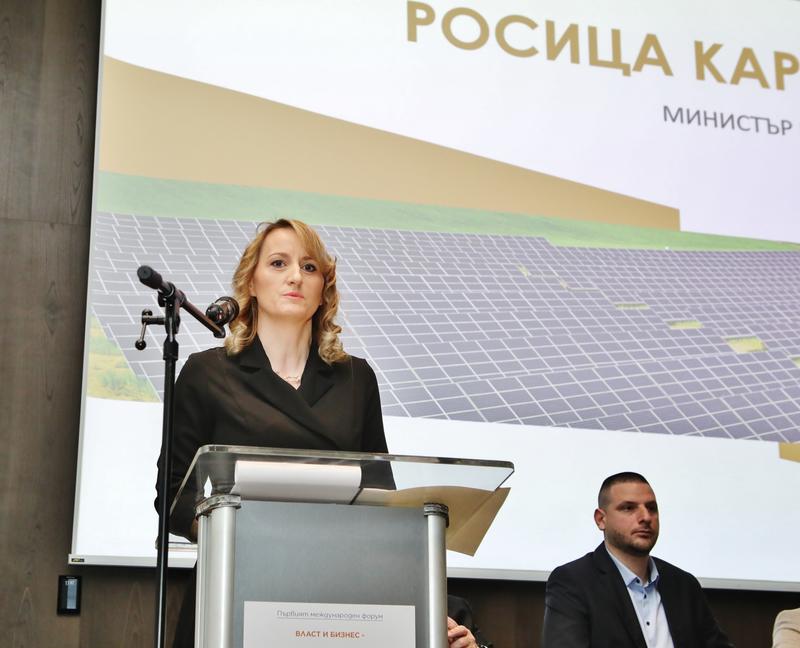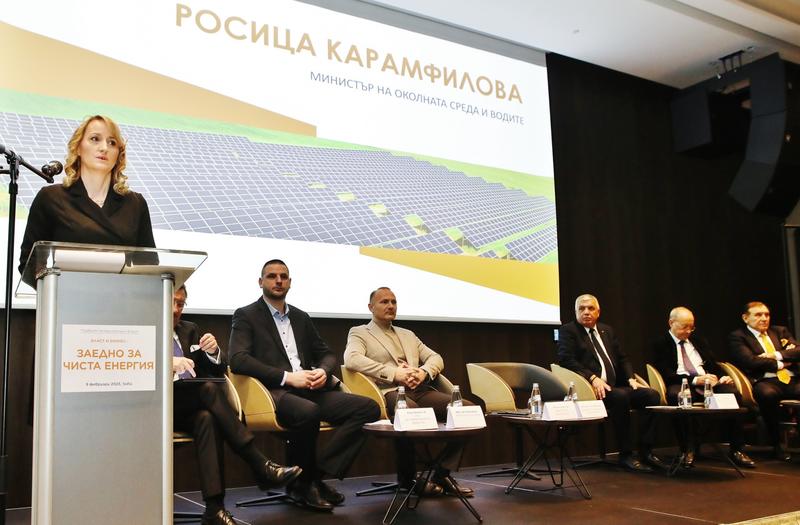Minister Karamfilova: To be a leader in climate neutrality, we embark on a clear and smooth transition, we have no time
09 Feb, 2023 | 17:11
“To be a leader in attaining climate neutrality, we are taking measures to ensure a clear and smooth transition, but it is important to remember that we do not have time. Only in partnership and empathy will we make decisions that will not only guarantee our energy security, but will also make us a leader on the path to decarbonization,” said the Minister of Environment and Water Rositsa Karamfilova at the forum “The Government and Business Together for Clean Energy", organized by the “Standart” newspaper.
Minister Karamfilova noted that sectoral legislation is one of the most difficult topics in the field of climate change policy and emphasized the new emissions trading scheme, which affects sectors, such as road transport and buildings, or the so-called ETS2 scheme. It will be implemented by taxing suppliers of fuels for buildings and for road transport. The scheme is expected to be introduced in 2027 at the EU level, with the possibility of a one-year postponement in the case of high energy prices.
“This is a new challenge that we will face. It is very important to clarify that the European Commission is still to develop the legal acts for the introduction and implementation of this scheme. We, as a member state, will actively participate in the negotiation process in the development of the implementing acts. These will determine the obligated persons and will assess the potential impact of implementation,” said Minister Karamfilova.
She explained that with regard to buildings, according to initial calculations, a significant reduction in greenhouse gas emissions is not expected, but at the national level there is a lack of data on the share of buildings that are heated by different types of energy carriers. “Therefore, in the census of the National Statistical Institute for 2021, the MOEW required that such a question be asked, so that we can have a basis for impact assessment,” the Minister added.
She reminded the forum participants that Bulgaria participates in the auctions within the pan-European auction platform. Revenues are received in real time and transferred to the “Electricity System Security” Fund. In addition, the Minister recalled the revenue we our country generated by selling emission reduction units to Germany in 2022 under the mechanism provided by the Effort Sharing Decision. “The funds that our country received will be used for activities to improve the energy efficiency of schools and kindergartens,” she said.
Minister Karamfilova clarified that within the Emissions Trading Scheme the commitments are neither sectoral, nor national. As of 2021, the Scheme covers over 10 000 installations in the energy-intensive sectors of electricity and heat production, oil refineries, steel, non-ferrous metals, cement, paper, chemicals, fertilizers, glass, ceramics, and commercial aviation.
In terms of targets, as early as 2019, the European Council adopted a pan-European target to achieve EU climate neutrality by 2050. A year later, the collective EU climate target by 2030 was increased from 40% to “at least 55%” compared to the levels of 1990. Thus, 15 legislative acts of the so-called “Fit for 55” package introduce measures to achieve the increased EU climate target of “at least 55%” by 2030 compared to 1990, and outline the path to climate neutrality by 2050.
An amendment to the Effort Sharing Regulation was adopted at the end of 2022 as part of the “Fit for 55” package. The changes provide for higher national targets for countries to reduce emissions in sectors outside the European Emissions Trading Scheme (namely road transport, inland maritime transport, buildings, agriculture, waste, and small industry). According to the agreement also reached at the end of 2022 between the European Parliament, the Council, and the Commission, all participants in the Scheme in the EU should collectively achieve a 62% reduction in emissions by 2030 compared to their 2005 level. In respect to total emissions of our country, by 2020 Bulgaria’s greenhouse gas emissions were 56.53% below their base year level.

